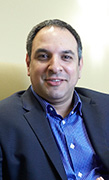CV: Dr. Nir Melamed
Bio basics: An associate scientist in Evaluative Clinical Sciences and the Women & Babies Research Program at Sunnybrook Research Institute (SRI), a staff physician in maternal-fetal medicine at Sunnybrook and an associate professor in the department of obstetrics and gynecology at the University of Toronto. Completed a fellowship in maternal-fetal medicine at U of T; residency in obstetrics and gynecology at the Rabin Medical Centre in Israel; MD and M.Sc. in molecular biology at Hebrew University, Jerusalem, Israel. Born and raised in Israel; moved to Canada in 2012 and joined SRI in 2014.
How do you like working at SRI?
Sunnybrook Health Sciences Centre and SRI offer a great setting for clinician scientists. Having protected time for research allows me to conduct research in addition to doing the clinical work and to develop new directions for collaboration with both national and international investigators in my field. Another important aspect is the access to experts and resources. Dr. Jon Barrett and I are working with scientists in the radiology department involving fetal and neonatal functional MRI studies and new studies involving unique algorithms for image processing that may predict lung maturity of preterm fetuses.
Other important resources include large provincial databases such as BORN (Better Outcomes Registry & Network) and collaborations between centres across the Greater Toronto Area (GTA), the GTA-Obstetrical Network. I would also like to mention Dr. Arthur Zaltz, chief of obstetrics and gynecology, who really provides exceptional support, resources and funding. He’s very supportive of the research projects.
Why maternal-fetal medicine?
Although I’m not truly objective, this is one of the most exciting disciplines in medicine. There is a new and exciting field that emerged over the last few years: fetal origin of adult disease, which suggests that many of the factors that affect the well-being of the fetus during intra-uterine life affect not only the immediate neonatal outcomes, but also have impact on the long-term health of the newborn, as a child, adolescent and adult. For example, growth restricted fetuses that had been exposed to placental insufficiency are at increased risk for obesity, diabetes, hypertension and cardiovascular disease later in life. This implies that primary prevention of adult disease starts already during fetal life, and that maternal-fetal medicine specialists who take care of women with complicated pregnancies, can impact not only the immediate pregnancy outcome, but also the life-long health of the fetus.
What is your research focus?
In addition to the long-term health of growth-restricted fetuses, I’m interested in fetal growth disorders in singleton and twin pregnancies, prediction of preterm birth in twin pregnancies and gestational diabetes.
Why is this research important?
If we go back to the concept of fetal origin of health and disease, we understand that optimizing the care of pregnant women really has long term impact and that the research we conduct can eventually improve the health of both infants and mothers by preventing pregnancy-related complications.
What’s the most rewarding part of your job?
It would definitely be the interaction with couples during pregnancy, especially in complicated pregnancies or in the case of couples who experienced previous pregnancy complications. We follow pregnant couples throughout the cycle of pregnancy starting from the first prenatal visit (sometimes even before they become pregnant for preconception counselling), the antenatal visits, as inpatients when they are admitted for various complications, during the course of labour and the postpartum period. Having the opportunity to walk with couples through this very exciting experience, to guide, counsel and reassure them at stressful times during pregnancy, and to contribute to a successful pregnancy with a healthy mother and a healthy child is a real privilege.
Do you travel a lot presenting your research?
As a unit we are very productive. We published a large number of studies over the last few years. We have now published over 100 peer-reviewed articles. These studies are presented at both national and international conferences.
What advice do you have for students and trainees pursuing a career in medicine?
I advise students to try and identify areas of interest early in their training, and to explore these areas from both the clinical and research perspectives. Such an experience can give them a considerable advantage later in their career when applying for residency, as well as for a staff position, and will allow them to develop a successful research career.
Do you have students that you mentor?
As a department, we have been very active in mentoring students, residents and fellows. This summer we are hosting 12 summer students from Canada as well as from the U.S. We are lucky to have a research coordinator, Susan, who helps us coordinate the activities. All summer students undergo general training in statistics, work with statistical software and write a manuscript. Most of the student’s work result in peer-reviewed publications, and many of the students present their work in international and national conferences. By the end of the summer, students gain the experience and skills that allow them to take a research question, design and conduct a study to address this question, analyze the data and write the manuscript.
How do you maintain a work-life balance?
This is definitely one of the major challenges for all those who practice medicine. Balancing between the clinical work, research, the constant need to read in order to remain up to date, and personal life is an ongoing challenge. Luckily I have a wife and four kids who help me find the right balance between these obligations.
Any hobbies and interests that you enjoy?
I like playing basketball. In addition, when I find the time I like to play the piano and guitar. My kids play as well, so we have a small ‘band’ at home. We like to compose songs and perform them together.
» Read more about his research in Have gestational diabetes? Timing of delivery matters






